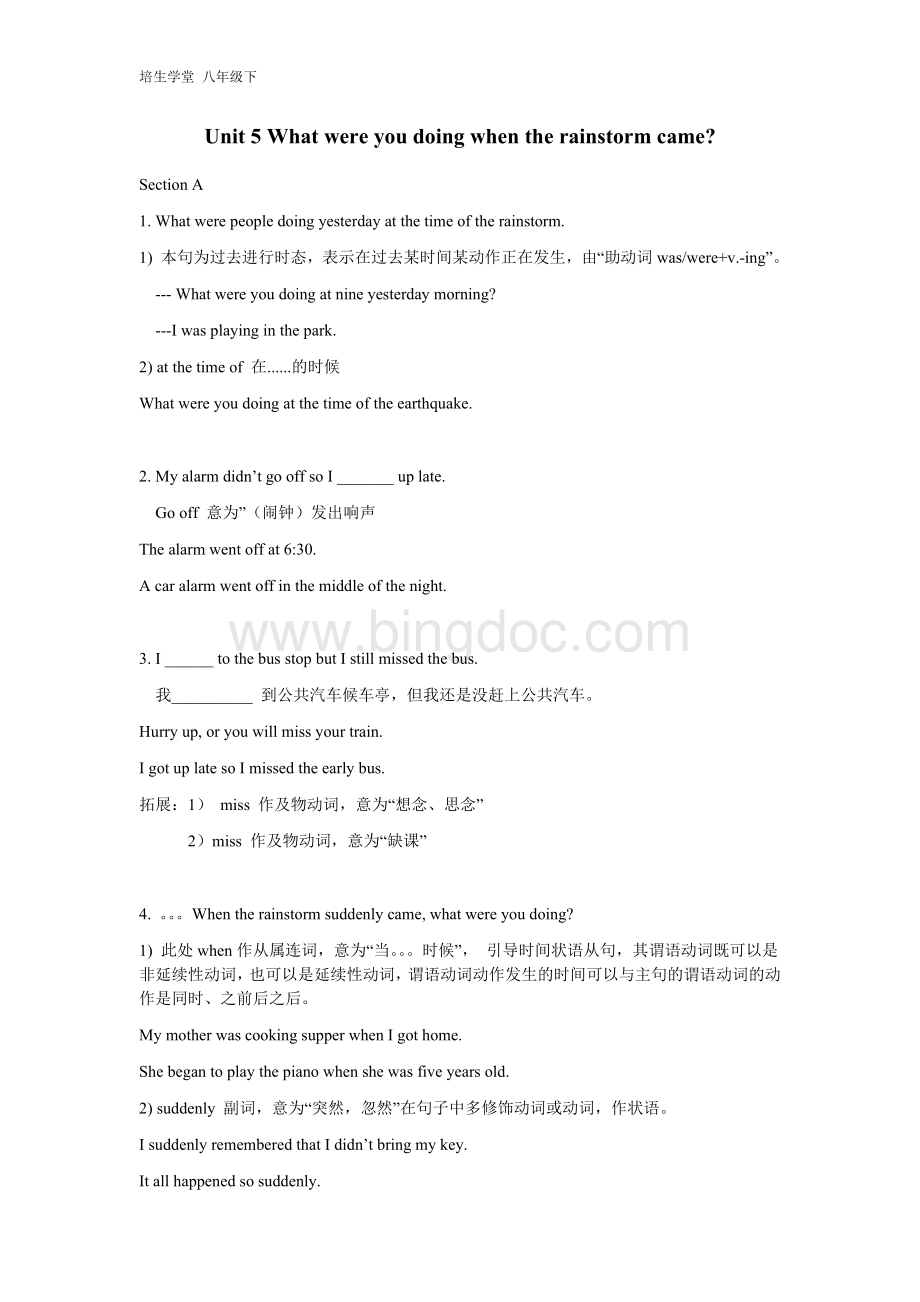人教版英语八年级下unit5讲解与练习.docx
《人教版英语八年级下unit5讲解与练习.docx》由会员分享,可在线阅读,更多相关《人教版英语八年级下unit5讲解与练习.docx(10页珍藏版)》请在冰点文库上搜索。

培生学堂八年级下
Unit5Whatwereyoudoingwhentherainstormcame?
SectionA
1.Whatwerepeopledoingyesterdayatthetimeoftherainstorm.
1)本句为过去进行时态,表示在过去某时间某动作正在发生,由“助动词was/were+v.-ing”。
---Whatwereyoudoingatnineyesterdaymorning?
---Iwasplayinginthepark.
2)atthetimeof在......的时候
Whatwereyoudoingatthetimeoftheearthquake.
2.Myalarmdidn’tgooffsoI_______uplate.
Gooff意为”(闹钟)发出响声
Thealarmwentoffat6:
30.
Acaralarmwentoffinthemiddleofthenight.
3.I______tothebusstopbutIstillmissedthebus.
我__________到公共汽车候车亭,但我还是没赶上公共汽车。
Hurryup,oryouwillmissyourtrain.
IgotuplatesoImissedtheearlybus.
拓展:
1)miss作及物动词,意为“想念、思念”
2)miss作及物动词,意为“缺课”
4.。
。
。
Whentherainstormsuddenlycame,whatwereyoudoing?
1)此处when作从属连词,意为“当。
。
。
时候”,引导时间状语从句,其谓语动词既可以是非延续性动词,也可以是延续性动词,谓语动词动作发生的时间可以与主句的谓语动词的动作是同时、之前后之后。
MymotherwascookingsupperwhenIgothome.
Shebegantoplaythepianowhenshewasfiveyearsold.
2)suddenly副词,意为“突然,忽然”在句子中多修饰动词或动词,作状语。
IsuddenlyrememberedthatIdidn’tbringmykey.
Itallhappenedsosuddenly.
5.Icalledagainateightandyoudidn’tanswertheneither.
此处either是副词,意为“也”,只用于否定句。
Either用于否定句,一般放在句末。
Idon’tlikephysicsandhedoesn’tlikeiteither.
Also一般用于肯定句和疑问句常放在句中。
ShespeaksEnglishandshealsowritesEnglish.
Too一般用于肯定句和疑问句,常放在句末。
Areyougoingtowork,too?
拓展:
either作代词,意为(两者中的)一个。
Herearetwobooks.Youcantakeeitherofthem.
6.Whydidyoucallsomanytimes?
Somany意为“那么多”,修饰复数名词。
7.Sowhileyouaresleeping,IcalledJennyandshehelpedme.
此处while作从属连词,意为“当。
。
。
时候,在。
。
。
期间”,引导时间状语从句,其谓语动词必须为延续性动词。
它强调主句的动作在从句动作的过程中发生,或者主句的动作与从句的动作同时发生,且持续时间一般较长。
Hefellasleepwhilehewaslisteningtomusic.
While“当。
。
。
时候”,其谓语动词必须为延续性动词,常用于过去进行时中。
Whileweweretalking,hecamein.
When“当。
。
。
时候”,其谓语可以是延续性动词,也可以是非延续性动词。
Thesunwasrisingwhenwegottothetopofthemountain.
拓展while与when在过去进行时中位置的转换:
WhileJohnwasplayingthepiano,Maryleftthehouse.
JohnwasplayingthepianowhenMaryleftthehouse.
(2011’山东青岛)Tomrushedintothehouse______hismotherwascooking.
A.asB.beforeC.whileD.After
8.Withnolightoutside,itfeltlikemidnight.
此处light作不可数名词,意为“光、光线”
拓展
1)light作可数名词,意为“电灯、光源”Don’tcrosstheroadwhenthetrafficlightsarered.
2)Light作形容词,意为“轻的、浅的”
Istheboxheavyorlight?
Ilikethelightgreendress.
3)light(lit/lighted)作动词,意为“点燃、照亮”
Hesatdownandlitacigarette.
9.Ben’sdadwasputtingpiecesofwoodoverthewindowswhilehismomwasmakingsuretheflashlightsandradiowereworking.
1.Wood作不可数名词,意为“木材,木头”,apieceofwood意为“一块木头”
Heputsomewoodinthefire.
拓展wood作可数名词,意为“树林”
Sheisafraidtowalkthroughthewoodsatnight.
2.Makesure意为“务必、确保、确认”,后面常接that从句或of短语。
Makesurethatyouputdowneverywordshesays.
Wemustmakesureofit.
10.Benwashelpinghismommakedinnerwhentherainbegantobeatheavilyagainstthewindows.
1)beat(beat,beaten)不及物动词,意为“敲打;(风雨等)冲击;(心脏、脉搏等)跳动
Someonewasbeatingonthedoor.
拓展beat作及物动词,意为”打、敲、打败”
Who’sbeatingthedrum?
Webeatthemby3:
2.
2)against作介词,此处意为“触、碰、撞、倚、靠”
Therainbeatagainstthecarwindscreen.
Hewasthrowingaballagainstthewall.
拓展against作介词,还意为“反对、违反”
Theyareagainsttheplan.
Thatisagainstthelaw.
11.Hefinallyfellasleepwhenthewindwasdyingdownataround3:
00a.m.
fallasleep为固定短语,意为“进入梦乡、睡着”
Diedown固定短语,意为“逐渐变弱;逐渐消失”
1)Asleep作形容词,意为“睡着”,常作表语,无比较级和最高级。
Heisasleeponthesofa.
2)Sleepy“困倦的、寂静的”Ifeelsleepy.I’mgoingtobed.
3)Sleeping“睡着的”,作定语;还可以表示与睡有关的东西,如睡袋:
sleepingbag,卧铺车厢:
sleepingcar,安眠药:
sleepingpill.
12.Whenhewokeup,thesunwasrising.
1)Wakeup意为“醒来;把。
。
。
叫醒”,可以不带宾语,也可以接名词或代词作宾语。
Pleasewakemeupatfiveo’clocktomorrowmorning.
2)Rise(rose,risen)作不及物动词,意为“上升、升起”
Theriverroseyesterdayafternoon.
辨析rise与raise
Rise“升起;提高;增加”作不及物动词,主语常为物。
Raise“升起;提高;增加”,主语常为人。
Thegirlraisetheboxtothetruck.
13.Althoughthestormbrokemanythingsapart;itbroughtfamiliesandneighborsclosertogether.
1)此处bring(brought,brought)作使役动词,意为“促使”
Theybroughtthingsright.他们使事情正确。
14.Butluckily,theriverwasfine.
Luckily作副词,意为“幸运地;幸亏”作状语。
拓展1)lucky作形容词,意为“幸运的;有好运的”
2)luck作不及物动词,意为“好运;幸运;运气”Goodlucktoyou!
15.Theroadswereicebecauseoftheheavysnowfromthenightbefore.
Icy作形容词,意为“结冰的;冰冷的;冷淡的”
拓展ice作不可数名词,意为“冰”
Theiceisthickenoughtoskateon.
英语中,一些与天气有关的名词,加后缀-y可构成相应的形容词。
Ice—icy;frost—frosty;cloud—cloudy;rain—rainy;snow—snowy;wind—windy;sun—sunny;fog—foggy
SectionB
1.Onthisday,Dr.MartinLutherKingwaskilled.
Waskilled意为“被杀害”,是一般过去时的被动语态。
由助动词was\were+过去分词构成。
当句子的主语为动作的承受者或不清楚动作的执行者时,可用被动语态来表示。
Thebridgewasbuiltlastyearbyworkers.
2.Myparentsdidnottalkafterthat,andwefinishedtherestofourdinnerinsilence.
1)therestof意为“剩余的”
Weeatsomeofthebutterandkeeptherestofitforbreakfast.
TomisfromEnglandandtherestofusarefromChina.
2)silence不可数名词,意为“沉默、缄默、无声”,短语insilence,意为“沉默、无声”
拓展silent形容词,意为“寂静的、无声的”
Hekeptsilentwhenheheardthenews.
3.Iwassoscaredthaticouldhardlythinkclearlythinkclearlyafterthat.
1)scared形容词,意为“害怕的;恐惧的”,常作表语,近义词为“afraid”
Sheisscaredofmice.
2)hardly副词,意为“几乎不;几乎没有”,表示否定
Hehardlydoeshomework.
辨析:
Hardly副词,意为“几乎不”Shewassoexcitedthatshecouldhardlysleep.
Hard形容词,意为“难的;硬的”;Shefoundithardtodecide.
副词,意为“努力地;猛烈地”Weshouldworkhard.
(2013.山东临沂)Davidwassoexcitedatthegoodnewsthathecould_____sayaword.
AnearlyBhardCeverDhardly
4.September11,2001—thedatealonemeanssomethingtomostpeopleintheUS.
1)此处alone作副词,意为“只有;仅仅”常用于名词或代词后
Youalonecanhelpme.只有你才能帮助我。
辨析:
alone与only
Alone“只有;仅仅”常用于被修饰的名词或代词后
Only“只有;仅仅”,要放在所修饰的名词或代词前
2)此处mean(meant,meant)作及物动词,意为“意思是”
Thissignmeansthatcarsmuststop.
Whatdoesthiswordmean?
拓展meaning是名词,意为“意思;含义”,既是可数名词,又是不可数名词。
Whatisthemeaningofthelife?
Theword“mean”hasseveralmeanings.
5.IhadtroublethinkingclearlyafterthatbecauseIwasveryafraid.
Havetrouble(in)doingsth.意为”做某事有困难或麻烦”,类似的词组还有:
haveproblems\difficulty(in)doingsth.
Thousandsofpeoplehavetroublefallingasleep.
Hehadnotroublefindingajob.
(2012.贵州毕节)—Ihave_____inlearningEnglishandI’msoworried.Couldyouhelpmewithit?
—Sure,I’dloveto.
AjoyBinterestCtroubleDfun
6.ButwhenIpointeditouttomyfriend,itwentaway.
1)pointout意为“指出”,人称代词作宾语时应放在动词之后,副词之前。
Thereisamistakeinthissentence.Canyoupintitout?
拓展
① point作不及物动词,意为“指向”,常与介词at,to,towards,等连用
Shepointedatme,laughing.
② Points作可数名词,意为”点;要点”
Let’sdiscussthedifficultpointsinthepassage.
2)goaway意为“离去”
7.Whilemybrotherwaslaughing,thetelevisionnewsreportedthatotherpeoplehadseenthelightaswell.
1)hadseen为过去完成时,表示在过去的某个时间或动作之前已经发生或完成的动作,由助动词had+过去分词构成
Irealizedthatihadleftmyhomeworkathome.
2)aswell相当一个副词,意为“还,也”,只用于疑问句或肯定句,常放在句末。
Aretheycomingaswell?
辨析aswell与aswellas
Aswell副词,意为“还,也”ShespeaksJapaneseaswell.
Aswellas“既。
。
。
又。
。
。
;不仅。
。
。
而且。
。
。
”作并列连词Shegrowsflowersaswellasvegetables.
语法专项
过去进行时
1.过去进行时的构成及用法
由助动词was\were+v.ing构成,表示过去某一时刻或时间段正在进行的动作。
时间状语,如then,atthattime,yesterday,at8:
00yesterdaymorning,allnight以及when\while从句等
Iwasreadingabokinthelibraryatthattime.
TheywerehavinganEnglishclassat9:
00yesterdaymorning.
Hewasreadingastory-bookwhentheteachercamein.
2.过去进行时的基本句式
1)肯定句:
主语+was\were+v.-ing+其他
Iwassleepingatteno’clocklastnight.
2)否定句:
主语+wasn’t\weren’t+v.-ing+其他
Iwasn’tsleepingatteno’clocklastnight.
3)疑问句:
Was\Were+主语+v.-ing+其他?
Wereyousleepingatteno’clocklastnight?
Yes,Iwas.\No,Iwasn’t.
(2013.天津)Isawhiminthelibraryyesterday.He_____abookatthatmoment.
AreadsBisreadingCwasreadingDwillread
短语归纳
1.Waitfor等候2.Lookfor寻找
3.Gooff(闹钟)发出响声4.Takeashower洗澡;淋浴
5.Pickup接电话6.Makesure务必;确保
7.Havefun玩的开心8.Fallasleep入睡;睡着
9.Diedown逐渐变弱;逐渐消失10.Wakeup醒来;叫醒
11.Inamess凌乱不堪;乱七八糟12.Cleanup打扫干净;整理
13.Intimesofdifficulty在困难时期14.Takephotos拍照
15.Playthepiano弹钢琴16.Turnon打开
17.Listentotheradio听收音机18.Rightaway立刻;马上
19havealook看20.Getto到达
21.Becauseof因为22.Makeone’sway行走;前进
23.Insilence沉默地;无声地24.Takedown摧毁;拆卸;记下
25.Tellthetruth说实话26.Pointout指出
27.Goaway消失;离开28.Aswell也
29.Threetimesaweek一周三次30.Callout喊出
用法集萃
1.Bebusydoingsth.忙着做某事
2.Seesb.\sth.Doingsth.看见某人某物正在做某事
3.Begin\starttodosth.开始做某事
4.Trytodosth.努力做某事
5.It’s+adj.+todosth.做某事是。
。
。
的
Havetrouble(in)doingsth做某事有困难
单元练习
一单项选择
()1.Aftermyalarmclockeverymorning,Igetupandgetdressed.
AturnsonBturnsoffCgoesonDgoesoff
()2.Thankyouverymuch,Ican’tpassthetestyourhelp.
AwithBbecauseofCbecauseDwithout
()3.—Look!
Thecat______fromthetree.
—Yes.It ______thetreejustnow.
A.isjumpingdown;climbedup B.isjumpingdown;isclimbingup
C.jumpsdown;wasclimbingup D.jumpsdown;climbed
()4.Whatwereyoudoing________ lastSundaymorning?
A.atB.in C.over D./
()5.WhileIwasatthe________,I